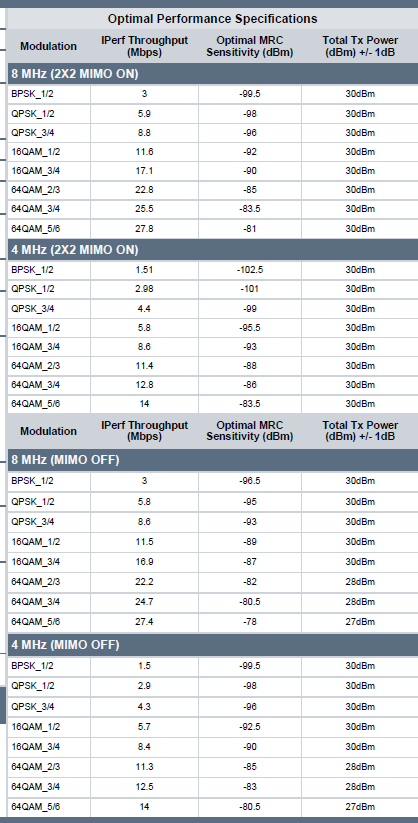Microhard pmddl2450 long range testing
-
Hello,
I ma using VOXL2 with system image 1.4.1 along with Microhard pmddl2450 Add-on board for UAV side and USB carrier board for GCS side. I followed setup instruction on this page and I was able to have stable connection between GCS and UAV. I configured my GCS side Microhard as master and UAV side Microhard as slave. I enabled 256 bit AES encryption, 8 MHz channgel was setup with 20 dbm of power.
I want to have 2 kms of LOS range with my setup. But as aircraft moved around 750 meters I started to face disconnections with UAV from GCS. On my UAV I 2S Li-ion 3500 mah battery pack powering complete aircraft and VOXL2 and on GCS I am connecting microhard to get power from Power bank of 2 Amp source current and ethernet connection is initiated with Android tablet. Also I using same molex antenna which are coming with Microhard modem. Are those antenna meant for long range applications?I want to understand a proper setup need for acutally achieving 2 kms of stable LOS communication with microhard as modem. Any help from community or ModalAI developes would be highly appreciated.
-
Range will be affected by:
- Antenna choice and placement
- Interference
Disable Wifi (which operates in the same frequency range) on both the drone (VOXL) and the ground station.
Additionally, you will only get good range if you are away from buildings that could have wifi routers.
Make sure the antenna are mounted such that there is direct line of sight to the ground station antennas, which should also be mounted such that there is direct line of sight to the drone
-
@Chad-Sweet Thanks for quick response.
Regarding antenna can we replace molex antenna with some other high gain antenna? I see to it as culprit over here. We pasted two molex antenna on two sides of the drone which wasn't facing towards GCS.
Regarding interference, we were testing the setup on complete isolated country side open land without any wifi routers and also we havne't connected any wifi router on UAV. So interference shouldn't be a problem over here.Mounting antenna in fashion where they would be always in line of sight is difficult with molex antenna setup which we receive with Microhard Add-on kit.
Any suggestion on antenna to be used for long range communication over current microhard would be highly appreciated.
-
Hi @Aks
Also make sure you have the lowest modulation order that you need, and do not over-specify bandwidth if you do not need it (i.e.: use 4MHz instead of 8MHz).
The maximum distance with microhard will only be done with MIMO, 4MHz, BPSK since it has the best receive sensitivity at -102.5dBm.
Here is a snippet of their public data brief (a year or so old however), showing the various receive sensitivities based on various settings. You want the lowest number you can sustain for your expected throughput so you can get the best (smallest) receive sensitivity.
If you set for 8MHz and 64QAM, you will have very short range at only -78dBm!

Hope this helps! -
@Vinny Thank you for the inputs. I tested with MIMO OFF BPSK_1/2 and was able to test for longer ranges. I have two queries.
-
I wasnt able to enable MIMO on my microhard motherboard even if they say pmddl2450 chips. Any help over here?
-
Can enabling AES 256 bit encryption reduce overall throughput?
-
-
Hi @Aks ,
You might need to request help from Microhard on those two questions or maybe post a fresh forum topic specific to the MIMO question so our broader team sees it.
The only thing I can caution about adding encryption to your data is to understand the difference between baud rate (or link rate) vs data throughput (or data rate). You may be lengthening the number of bits per packet to include the encryption info yet your effective baud rate is unchanged, hence your effective user data throughput can decrease hence making it appear you have lower rate rates despite the radio performing well.
Something to think about.
Usually the more complex the interface with error bits, check bits, encoding bits, etc, add more "overhead" to the link relative to the user data. Perfect example: USB2 with 480Mbps... most applications can only get ~300-340Mbps from it, despite running at 480. -
 V Vinny referenced this topic on
V Vinny referenced this topic on
-
@Vinny said in Microhard pmddl2450 long range testing:
Hi @Aks ,
You might need to request help from Microhard on those two questions or maybe post a fresh forum topic specific to the MIMO question so our broader team sees it.
The only thing I can caution about adding encryption to your data is to understand the difference between baud rate (or link rate) vs data throughput (or data rate). You may be lengthening the number of bits per packet to include the encryption info yet your effective baud rate is unchanged, hence your effective user data throughput can decrease hence making it appear you have lower rate rates despite the radio performing well.
Something to think about.
Usually the more complex the interface with error bits, check bits, encoding bits, etc, add more "overhead" to the link relative to the user data. Perfect example: USB2 with 480Mbps... most applications can only get ~300-340Mbps from it, despite running at 480.Just replying here with our own findings which we did recently for anyone looking to use MH radios. We opted for the pMDDL2350 specifically because it would have slightly less interference from the 2.4ghz WiFi bands. Vinny is spot on, use the lowest channel width and compression ratio you need for your requirement. We did some tests with the basic pigtail antennas and found that we could get about 800ft through solid concrete and brick buildings before the data would not transmit. In clear site, this turned into about 4km at about 10mb/s which is more than enough for telemetry and H.265 video with 256AES encryption (this was also done in a high interference area in a city, but with clear LOS for the radios). Also, as you pointed out the antennas on both sides can be improved. For the drone side you can use upgraded monopole type, and for the base you can order either more directional long range antennas, or a monopole, and Microhard also sells amplifiers if needed for really long range. It all depends on your use case. For us, ultra short range, around 500m radius in and around structures was needed, and these are way better than standard WiFi.
-
@Mastermind This is great info! Thanks for sharing!
-
This post is deleted!